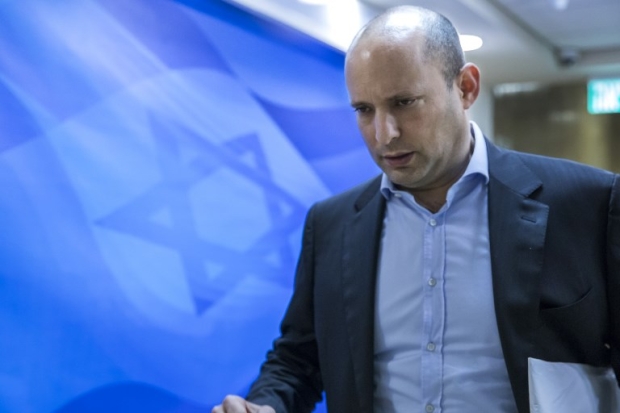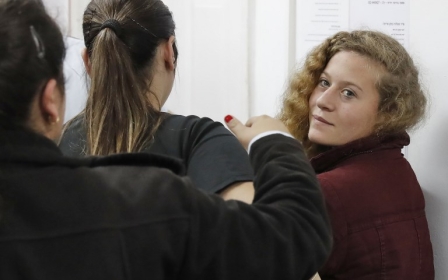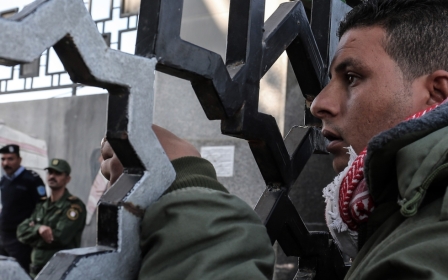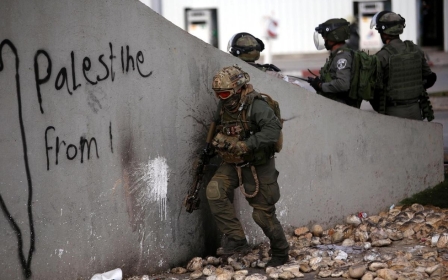How Israel dehumanises Palestinian resistance

There is a standard method by which the international community reacts to Israel's violations of Palestinian rights, depending on the visibility of the oppressive measures and whether they fit the pattern of previous condemnations. The result is a process of selective awareness, whereby the imprisonment of Palestinian children, home demolitions, settlement expansion and forced displacement are chosen for futile criticism and condemnation.
When it comes to other measures that directly show Israel's intention to target Palestinian resistance and disappear Palestinians, however, the silence is striking. In early February, the parents of a soldier killed in occupied East Jerusalem told the Knesset Internal Affairs Committee that the bodies of Palestinians held by Israel should either be held permanently or thrown "into the sea" as deterrence.
During the same session, the request was echoed by internal affairs committee chairman MK Yoav Kisch, who referred to the US narrative of al-Qaeda leader Osama Bin Laden’s body being disposed of at sea.
Historical precedents
Kisch's propagation of the US narrative serves various purposes. It promotes the actions of one of Israel's main allies, while also exploiting "terrorism" propaganda to dismantle the Palestinian anti-colonial struggle - a tactic Israeli Prime Minister Benjamin Netanyahu has used on several occasions under the pretext of security concerns.
There are historical precedents for the disappearance of political opponents being incorporated into routine practice. Replete with examples is Latin America, where US-backed dictatorships instilled terror by disappearing their opponents.
Chile and Argentina under Augusto Pinochet and Jorge Rafael Videla, respectively, made use of "death flights", dumping the tortured bodies of opponents into the ocean from helicopters. In Argentina, it is estimated that around 30,000 people were disappeared.
The absence of outrage over Israel’s targeting of Palestinians, and its incitement to disappear those involved in the anti-colonial struggle, is an anomaly in the context of human rights
Israel's existence is based on the premise of a non-existent Palestine. With nothing to justify the early Zionist claims of a barren land, the ethnic cleansing and systematic displacement of the Nakba were gradually perfected into a series of oppressive measures that resulted in the same outcomes over an extended period of time.
The international response has favoured Israel: repeated violations of human rights and international law have elicited nothing more than repetitive condemnations. This has enabled the Israeli government to expand its security narrative and oppressive measures.
In February 2016, Israeli Education Minister Naftali Bennett made a call to "bury Palestinian anti-occupation fighters in secret cemeteries and knock down all the homes in their native villages." While Bennett is well known for his belligerence, his comment must be read within the context of Israel's persistent refusal to hand over the bodies of slain Palestinians to bereaved families.
Normalisation of Israeli violence
In December, Israel's Supreme Court ruled against such a practice, yet the government has persisted, despite the practice contravening both Israeli law and Article 130 of the fourth Geneva Convention.
Israeli MKs also defended the practice during the recent Knesset committee meeting. Claiming incitement during funerals, MK Mickey Levy described returning bodies in the middle of the night under extreme security measures: "I deployed 700 officers so that no one other than close relatives would leave the house."
Of particular note was MK Kisch's closing remarks: "The High Court must also understand the human background. This is an absurd situation - we are breaking the tools to fight terror with our own hands."
One example came earlier this year when a controversial proposal from Defence Minister Avigdor Lieberman won preliminary approval in the Knesset. The proposed law would make it easier for an Israeli court to impose the death sentence on those convicted of "terrorist" attacks. The "terrorist" jargon is exclusively applied to Palestinians involved in resistance activities against Israeli oppression.
Criminalising resistance
Collectively, Israel has already perfected the normalisation of ongoing violations, to which the world fails to react. Home demolitions and forced displacement are categorised under the wide banner of refugee issues. Deprivation of basic needs falls under the humanitarian agenda. Gaza’s deteriorating environment has been termed "uninhabitable".
At the same time, Palestinians directly engaged in resistance activities are criminalised to the point that their humanity is rendered non-existent.
In recent years, the Israeli government has imposed force-feeding on hunger-striking Palestinian prisoners, committed extrajudicial killings, handed out lengthy prison sentences to Palestinians who have thrown stones to resist state and settler violence, and withheld the remains of Palestinians murdered by Israel, among other actions.
All the while, the colonial state enjoys impunity for its incitement, such as disappearing Palestinians in secret cemeteries or calling for their bodies to be disposed of at sea.
In this manner, Israel is ensuring that all Palestinians are punished severely. The various forms of collective punishment distract from the broader intent to completely subjugate Palestinians, while allowing the international community to make a show of pleading for the humanitarian cause while blatantly disregarding the humanity of Palestinian resistance actors.
International silence
The absence of outrage over Israel’s targeting of Palestinians, and its incitement to disappear those involved in the anti-colonial struggle, is an anomaly in the context of human rights. From an international perspective, however, the silence is expected.
Unlike the social movements in Latin America, which were able to mobilise against violations and disappearances, Palestinians are facing increasing isolation, to the point that the EU’s opposition to the death penalty proposal, for example, was reduced to a general tweet. Calls by government ministers and settlers to disappear Palestinians have failed to strike a chord internationally.
Where does the collective and premeditated silence leave Palestinians? With resistance and survival being threatened by punitive measures, Palestinians - whether they resist or remain passive - are facing an extermination agenda that is not being contested by the international community.
What will it take to call out the degeneration of international institutions and their exploitation of human rights? History has illustrated that the 1948 ethnic cleansing of Palestine was sidelined by the UN to welcome Israel's inception.
Without a collective, international approach, disappearing Palestinians will complete the cycle of isolation, ending in oblivion.
- Ramona Wadi is an independent researcher, freelance journalist, book reviewer and blogger specialising in the struggle for memory in Chile and Palestine.
The views expressed in this article belong to the author and do not necessarily reflect the editorial policy of Middle East Eye.
Photo: Palestinians with al-Nasser Salah al-Deen Brigades, the military wing of the Popular Resistance Committees, gesture at the end of a training exercise in Khan Younis in the southern Gaza Strip on 19 September 2017 (AFP)
Middle East Eye propose une couverture et une analyse indépendantes et incomparables du Moyen-Orient, de l’Afrique du Nord et d’autres régions du monde. Pour en savoir plus sur la reprise de ce contenu et les frais qui s’appliquent, veuillez remplir ce formulaire [en anglais]. Pour en savoir plus sur MEE, cliquez ici [en anglais].






